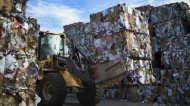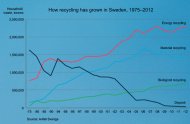Processing Of Electricity Debris
 Today, Sweden is processing 99 per cent of all waste. This country has become so well treated with waste that it is forced to import 700,000 tons of garbage from neighbouring countries to generate energy for its needs. How did they do that?
Today, Sweden is processing 99 per cent of all waste. This country has become so well treated with waste that it is forced to import 700,000 tons of garbage from neighbouring countries to generate energy for its needs. How did they do that?
Today, there is little “musor” in Sweden. In one way, 99 per cent of all household waste is processed. This country has experienced this revolution in recent decades, with only 38 per cent of domestic waste being treated in 1975.
Today, processing stations are generally 300 metres away from any residential area. Most Swedes share all waste for processing in their homes and store it in special containers or take it directly to the recycling station.
Towards reprocessing
" Swedes can do more, given that about half of all domestic waste is incinerated, that is, becoming energy. " Weine Wiqvist considers the Director-General of the Waste and Disposal Association (Avfall Sverige).
 He explained that reuse of materials or products meant less energy to produce. It's better than burning one and doing another from scratch.
He explained that reuse of materials or products meant less energy to produce. It's better than burning one and doing another from scratch.
We're trying to maximize reprocessing, not recycling.
Meanwhile, Swedish households continue to separate newspapers, plastics, metals, glass, electrical appliances, lamps and batteries. Many municipalities also encourage consumers to separate food waste. And all this is reused, processed or composted.
Newspapers are turned into paper mass, bottles are recycled or refilled into new elements, plastic containers become plastic raw materials; food is combined and become fertilizer or biogas. Musor trucks often work for processed electricity or biogas. Wastewater is purified to the extent that they can be drinking. Special trucks drive around town and take electronics and hazardous waste, chemicals. Pharmaceuticals accept the rest of the medicine. Dry waste, like old TV or broken furniture, Swedes are taken to processing centres on the outskirts of towns.
Related posts:
 In the Volgograd Region Administration, a concession agreement was signed on public utilities, recycling, disposal (storage) of solid household waste. According…
In the Volgograd Region Administration, a concession agreement was signed on public utilities, recycling, disposal (storage) of solid household waste. According… The building is already over, and a bunch of building debris and waste remains lying, rather than seriously ruining the type of capital. As a result, today the required…
The building is already over, and a bunch of building debris and waste remains lying, rather than seriously ruining the type of capital. As a result, today the required… I ve done a lot of franchise monitors, but I ve got the usual bids, a cafe or a store that s already starting to compete with me, I thought I was bored, telling…
I ve done a lot of franchise monitors, but I ve got the usual bids, a cafe or a store that s already starting to compete with me, I thought I was bored, telling… What are the rules for sorting debris on French Riviera? When we rented an apartment in Paris, there were a few large tanks in the interior courtyard where classic…
What are the rules for sorting debris on French Riviera? When we rented an apartment in Paris, there were a few large tanks in the interior courtyard where classic… Is discipline important in investing? Without any doubt it is true! A disciplined investor will never buy securities without serious analysis or pay attention to…
Is discipline important in investing? Without any doubt it is true! A disciplined investor will never buy securities without serious analysis or pay attention to… Structural debris: brick, brisket, concrete, stoves obtained during the dismantling of construction sites are transformed into a secondary building block on GOST…
Structural debris: brick, brisket, concrete, stoves obtained during the dismantling of construction sites are transformed into a secondary building block on GOST… Professional presentation demands more than just content - it requires the right display platform. The Black Easel stands out as a sophisticated solution for artists…
Professional presentation demands more than just content - it requires the right display platform. The Black Easel stands out as a sophisticated solution for artists… An incineration factory in the heart of Vienna is unique not only because it does not completely damage the environment, but it also, unlike its collars, decorates…
An incineration factory in the heart of Vienna is unique not only because it does not completely damage the environment, but it also, unlike its collars, decorates… The Territorial Waste Management Scheme was held by the Parliamentary Hearings at Medoldum Parliamentary hearings of the Regional Waste Management Scheme were held…
The Territorial Waste Management Scheme was held by the Parliamentary Hearings at Medoldum Parliamentary hearings of the Regional Waste Management Scheme were held… Environmentally sound behaviour is very often consistent with the principles of rationality, servitude, prudential treatment of purchases, by their time, to environmental…
Environmentally sound behaviour is very often consistent with the principles of rationality, servitude, prudential treatment of purchases, by their time, to environmental…